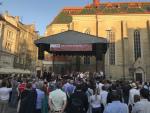It’s really hot and humid here in Novi Sad, Serbia. This morning threatened thunder and rain, but it’s ended up being just … er … hot and humid. Fortunately, the 500 people in the conference center don’t have to sit too closely together.
 The theme yesterday was ‘hospitality’; today’s is ‘justice’. We began with a Bible study on 1 Kings 21 (Naboth and the art of hiding behind the law when you do terrible things) by a Brazilian theologian, Dr Elaine Neuenfeldt. This was followed by a young German lawyer, Lisa Schneider, speaking (in German) both thematically and practically about justice – her main plea being that the church should never try offering young people simple solutions to complex questions. She stressed the need for young people to see the church demonstrating authenticity (‘practise what you preach, or just stop preaching sort of thing’) – young people, she said, are passionate about truth and justice.
The theme yesterday was ‘hospitality’; today’s is ‘justice’. We began with a Bible study on 1 Kings 21 (Naboth and the art of hiding behind the law when you do terrible things) by a Brazilian theologian, Dr Elaine Neuenfeldt. This was followed by a young German lawyer, Lisa Schneider, speaking (in German) both thematically and practically about justice – her main plea being that the church should never try offering young people simple solutions to complex questions. She stressed the need for young people to see the church demonstrating authenticity (‘practise what you preach, or just stop preaching sort of thing’) – young people, she said, are passionate about truth and justice.
A Swiss Methodist bishop, Dr Patrick Streiff, reflected on this (in French). I found his final point the most interesting: an over-preoccupation with the language of values ignores the actual root of Christian relationship: our unity in Christ. He observed that in many official comment on social themes we refer to “Christian values for Europe”:
Certes, il est nécessaire que les Églises participent au dialog – et parfois dispute – sur des valeurs. Mais parler des valeurs se base déjà sur une certaine abstraction de ce qui est au cœur de notre foi. Notre foi ne se base pas sur des valeurs, mais sur le Dieu trinitaire qui s’est révélé à nous et dont la relation avec lui se répercute dans certaines valeurs qui nous sont chères.
In other words, Christian faith is rooted in the trinitarian God, not an abstract set of values. He then illustrated this in the following way:
Dernièrement, en Autriche, après une entrevue du ministre avec tous les dirigeants des religions officiellement reconnues, le ministre voulait encore voir le sanctuaire dans notre immeuble méthodiste. Le surintendant le lui a montré et expliqué qu’il y a une paroisse de langue allemande et une paroisse de langue anglaise qui se réunissent chaque dimanche, avec des personnes d’une trentaine de nations. Le ministre était étonné, puis a dit : « oui, il semble que c’est possible si on a les même valeurs ». Un peu plus tard et à nouveau seul, le surintendant s’est dit : « Ce n’est pas vrai. Ces gens ont des valeurs souvent très différentes, mais ils se réunissent ici à cause de leur foi en Christ. »
He concludes with this question: “How are we to witness to that which lies at the heart of our faith when we address ethical questions?”
The point is that Christians in Europe inhabit different cultural and political contexts, these arising from different histories of conflict and loss. Serbian Orthodox Christians will have a different approach to Kosovo, Muslims and justice from that of a Welsh Presbyterian (for example). Our perspectives and values (such as justice, reconciliation and the conditions these demand) might be seen differently depending on our communal experience; what unites Christians is our unity in Christ – which is shaped like a cross before which we must be repentantly hopeful. Unity of relationship and mutual obligation is not the same as unanimity of opinion on values.
In the light of this, this amazingly international and multilingual conference went on to address head on challenges to the future of Europe. No fantasy here, but, rather, a head-on articulation of the hard challenges facing Europe in the light of corruption, populist nationalism, and the collapse of a common vision.
On that cheerful note, we move on to business.
Advertisements